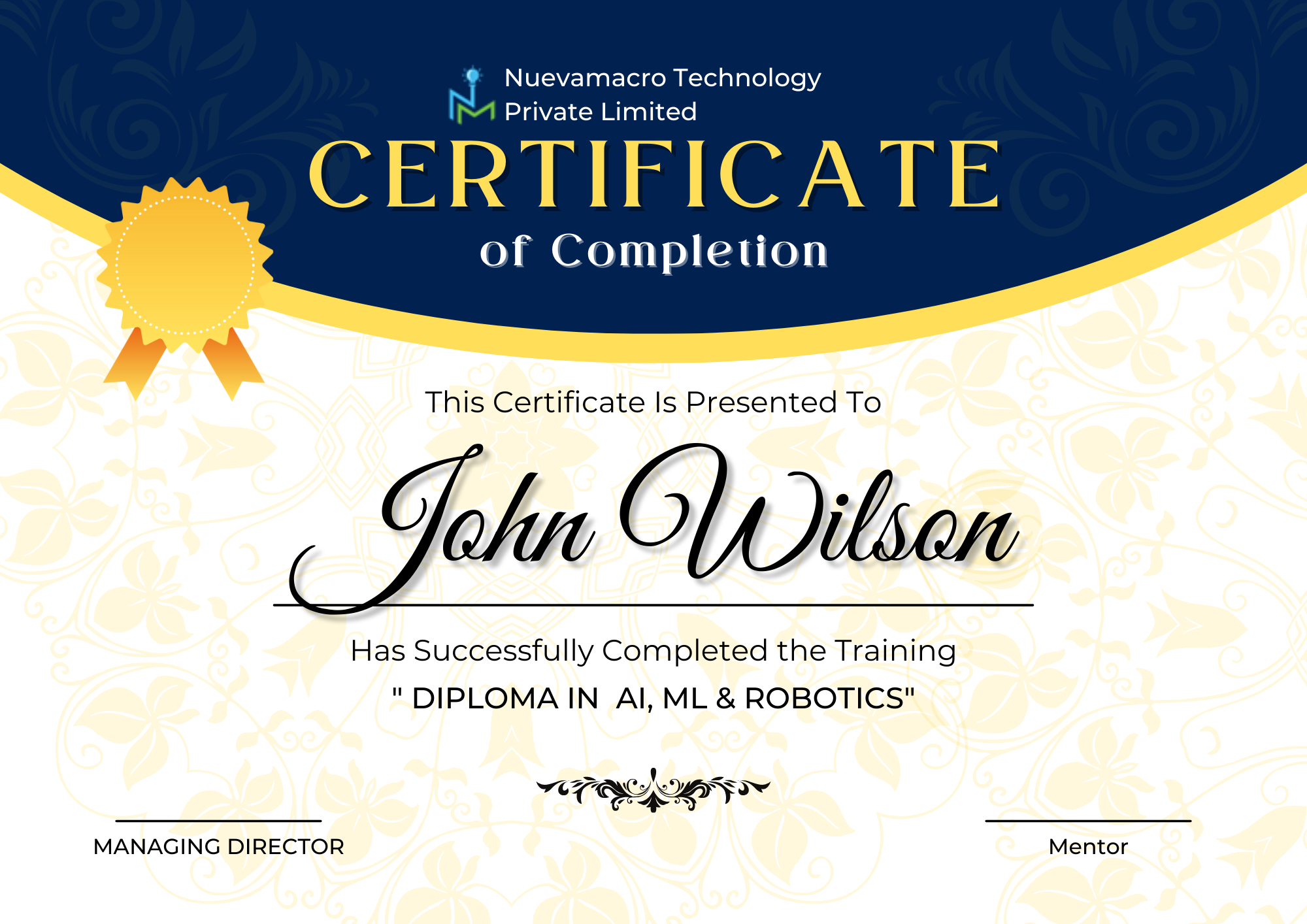What you'll learn
-
Career Opportunities: Proficiency in these fields opens doors to exciting and well-paid job roles.
-
Innovation: You can create groundbreaking solutions, from self-driving cars to medical diagnostics.
-
Problem Solving: AI, ML, and robotics empower you to tackle complex real-world challenges.
-
Automation: Streamline tasks, improve efficiency, and reduce human effort.
-
Interdisciplinary Skills: Gain expertise in computer science, mathematics, and engineering.
-
Ethical Impact: Shape responsible AI and robotic systems for societal benefit.
-
Global Relevance: These technologies impact industries worldwide.
-
Continuous Learning: Stay at the forefront of technological advancements.
Course content
What is AI?
Brief History of AI
Applications of AI
Logic and Reasoning
Probability and Uncertainty
Machine Learning Basics
Uninformed Search Strategies
Informed (Heuristic) Search Strategies
Constraint Satisfaction Problems
Propositional and First-Order Logic
Semantic Networks
Frames and Scripts
Rule-Based Systems
Case-Based Reasoning
Bayesian Networks
Supervised Learning
Unsupervised Learning
Reinforcement Learning
Syntax and Parsing
Semantics and Pragmatics
Information Extraction and Retrieval
Robot Hardware and Software
Perception and Action
Robotic Planning
Ethical Considerations in AI
Bias and Fairness
AI and Society
Deep Learning
Reinforcement Learning
Explainable AI
Get a completion certificate
Share your certificate with prospective employers and your professional network on LinkedIn.

Course Overview
1. Introduction to AI
- What is AI: Definition of AI, differentiating AI,
Machine Learning, and Deep Learning.
- Brief History of AI: Key milestones and figures in
the development of AI.
- Applications of AI: Real-world applications of AI
in various fields like healthcare, finance, transportation, etc.
2. Foundations of AI
- Logic and Reasoning: Introduction to logic, types
of logic, logical reasoning.
- Probability and Uncertainty: Basics of
probability, dealing with uncertainty in AI.
- Machine Learning Basics: Introduction to Machine
Learning, types of Machine Learning, basic algorithms.
3. Search Algorithms
- Uninformed Search Strategies: Breadth-first
search, depth-first search, uniform-cost search.
- Informed (Heuristic) Search Strategies: Greedy
best-first search, A* search.
- Constraint Satisfaction Problems: Definition,
examples, solving strategies.
4. Knowledge Representation
- Propositional and First-Order Logic: Syntax and
semantics, usage in AI.
- Semantic Networks: Definition, structure, usage in
AI.
- Frames and Scripts: Definition, structure, usage
in AI.
5. Reasoning
- Rule-Based Systems: Introduction to rule-based
systems, inference in rule-based systems.
- Case-Based Reasoning: Introduction to case-based
reasoning, process of case-based reasoning.
- Bayesian Networks: Introduction to Bayesian
networks, inference in Bayesian networks.
6. Machine Learning
- Supervised Learning: Introduction to supervised
learning, algorithms like linear regression, decision trees, SVMs.
- Unsupervised Learning: Introduction to
unsupervised learning, algorithms like K-means, hierarchical clustering.
- Reinforcement Learning: Introduction to
reinforcement learning, concepts like reward function, value function,
Q-learning.
7. Natural Language Processing
- Syntax and Parsing: Introduction to syntax,
parsing sentences.
- Semantics and Pragmatics: Understanding meaning in
language, context in language.
- Information Extraction and Retrieval: Techniques
for extracting and retrieving information from text.
8. Robotics
- Robot Hardware and Software: Components of a
robot, software used in robotics.
- Perception and Action: How robots perceive their
environment and act upon it.
- Robotic Planning: Techniques for planning actions
in a robot.
9. AI Ethics
- Ethical Considerations in AI: Ethical issues in
the use of AI.
- Bias and Fairness: Understanding and mitigating
bias in AI systems.
- AI and Society: Impact of AI on society.
10. Advanced Topics
- Deep Learning: Introduction to deep learning,
neural networks, training deep learning models.
- Reinforcement Learning: Advanced topics in
reinforcement learning like policy gradients.
- Explainable AI: Techniques for making AI models more interpretable and transparent.










